On the first day of 2024, I found myself in a New Year’s Day Yoga Mala class, moving through 108 sun salutations. Our teacher, Stella, had asked us to think of a symbolic word for the upcoming year, which we’d share and record at the end of class.
Around salutation #57, my word finally came to me: flourish. I balked immediately. Flourish? Really? Something about it made me feel anxious, as though I were taunting the universe just by uttering it, daring fate to intervene. I tried to push the word away, hoping another would take its place, but nothing else surfaced. I relented. Flourish it would be. It demanded to be heard. As I moved through upward dogs and back-bent towards bliss, clichéd images of blooming flowers and ripe pomegranates flashed in my mind–I rolled my eyes hard in response.
In 2023, my word had been gentle – a salve for my body and mind after a tumultuous prior year marked by the death of my beloved dog, a necessary friendship breakup, a reckoning with my career trajectory, and my first-ever bout with depression. (I’m fun!) Gentle turned out to be the perfect word, guiding me through heartbreak and radical personal change. I took more rest than ever. I ditched my to-do lists. I started Zoloft, got rid of my Apple Watch, and tried to be less of a receptor for others’ pain and needs. I stopped letting work define my identity, found an exceptional therapist, and, most importantly, slept more.
But flourish? The word felt heavy on my tongue as I approached Stella, sweaty and finally finished with practice. After a year of gentleness, part of me was apparently itching for new growth. Saying it aloud felt like a dare, both exciting and terrifying. “Interesting choice,” Stella replied, staring into the depths of my being, the way only yoga teachers can. I sensed she knew something I didn’t.
A year is just a collection of days we imbue with meaning – birthdays, anniversaries, the new wrinkle on your forehead loudly proclaiming, you’re aging, babe. Beneath the milestones of a college freshman year, a tough annual review, a glittering Instagram recap, is the literal passage of time – Earth’s journey around the sun. Days spent spinning on an axis, the tilt of Earth ushers in the seasons – summer, spring, winter, fall. And we gleefully seize the opportunities that culture and capitalism hand us: the must-take trips to far-off destinations, Marie-Kondo-inspired spring cleaning, Sweet 16s, chestnut praline lattes, New Year resolutions we commit to keeping and inevitably break, the new season of Severance (January 2025 can’t come soon enough).
But a year contains so much more than to-dos, actions, and accomplishments. A year of days is really an opportunity to reflect on who we are – to hold the mirror up to our true selves and witness how we are responding to time. Hindsight makes this easy; doing it in the moment is harder.
This past year, I spent many days wondering why I chose flourish to guide me through this trip around the sun (and in an election year, no less). It wasn’t comforting, as gentle had been, and as life’s complexities piled up, it felt like I’d unwittingly chosen the “difficult level” of a video game. Any notion that flourish would bring success, luxuriant growth, a house purchase, a book deal, or some ascent to my truest self quickly evaporated. I learned that how we approach a year doesn’t guarantee outcomes; instead it shapes our mindset as we face what’s beyond our control – and informs how we emerge on the other side.
January. The sun rises, and the sand is soft beneath my feet. The distant sky glows with shades of pale coral, lavender, and cornstalk, lighting up the end of the road as I walk and talk with my mother, Alison, who’s making breakfast back in Maine. It’s the end of a girls’ weekend in Joshua Tree. Though it’s only 5:37 a.m. and still January, 2024 already feels filled with symbolic moments. On January 10th, my husband and I spot a whale surfacing close to shore along the Pacific Coast, a few miles out from our beach in Zihuatanejo. On the 14th, I create a shrine for my grandmother and my dog, Billie, appealing to divine feminine energy (no noticeable response yet 🙂). By the 21st, I’m experimenting with podcasting and contemplating quitting social media. On the 25th, I watch a blood-red wolf moon rise with my women in tow. On the 27th, I make friendship bracelets, light a fire in the desert, and sway to live music at a bar that, while way too Christian for my atheist heart, manages to get me moving.


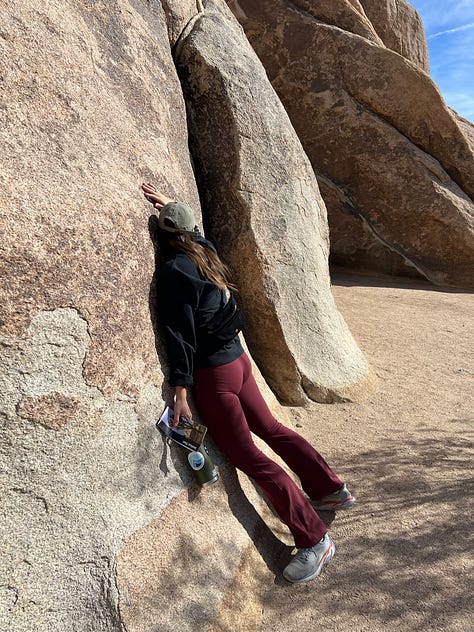
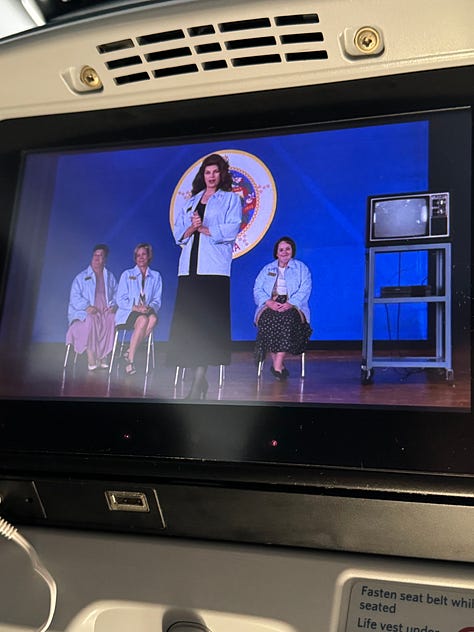
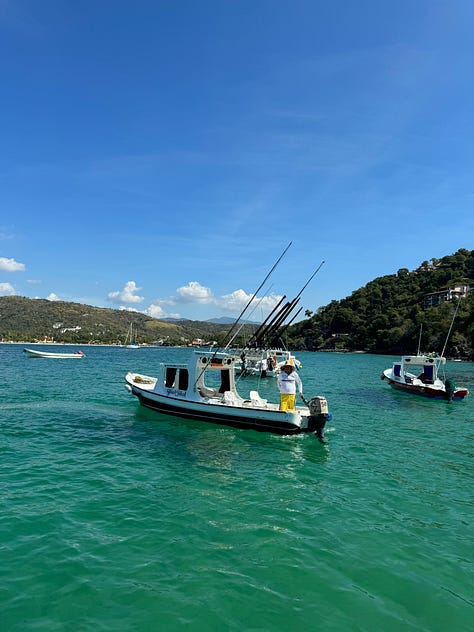
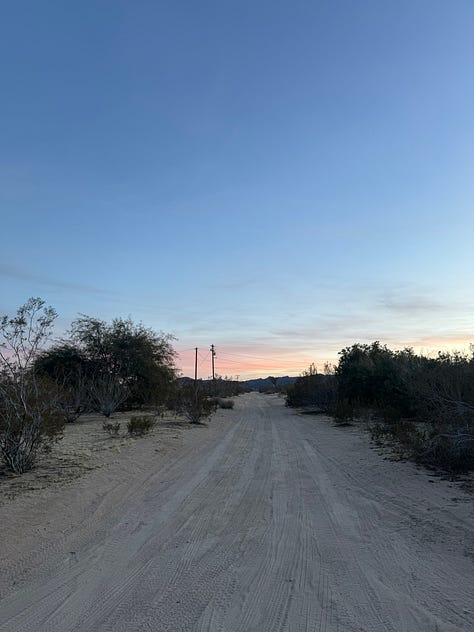


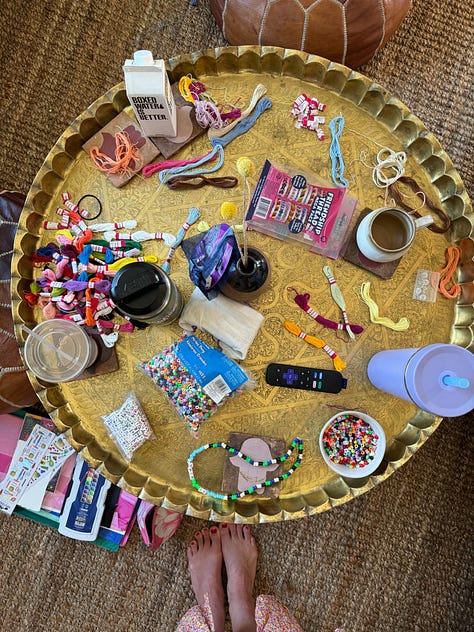
February. I am sitting inside a Planned Parenthood, feeling both 35 and 15 at the same time. It’s pouring rain outside—a rarity for Los Angeles—and the air smells of wet concrete and coffee. The waiting room is filled with women in various stages of need. The receptionist validates my parking ticket and turns up the volume on a Netflix show, where, as it happens, a man is beating a woman senseless (whattup, Narcos). An odd choice for this moment, but I choose not to dwell on it.
Sitting in this guarded, windowless beige room, I reflect on how much of my life has been shaped by women’s reproductive healthcare. I’m deeply grateful for it, horrified by the overturning of Roe, and worried for a future where access is continually under threat. Championing a woman’s right to choose, advocating for and appreciating access to birth control, fostering open conversations around menstruation—these aren’t exactly my life’s work the way they are for Cecile Richards, but they’ve always been a part of it. As life presents opportunities and takes them away, I find myself knitting closer to my body, learning to interpret her signals, hear her pleas, and feeling a profound kinship with the women who’ve come before me, those around me now, and those who’ll come after.
The nurse calls my name, and we walk back together. She compliments my shoes (neon yellow clogs) and gently places her hand on my elbow as she guides me. “How are you feeling?” she asks. Sisterhood is sacred, I think and I know. We are here to protect each other.
March. Richard Serra dies, and I recall the works of his I’ve been lucky enough to see up close. Nate and I sleep on a Malibu beach and neglect to wear sunscreen, which we pay for later. I bake mini black-and-white-cookie-inspired pies, unexpectedly winning third place at our neighbor’s annual competition. I admire the spring trees, the wispy grass, and how the light caresses them. Dog snuggles, trips to Vroman’s for new books, and moon-gazing all make numerous appearances this month. My parents finally visit and we trek around the Huntington Gardens. At a work event, I drum on a djembe as a forced bonding activity, but on the plane home, I watch Drop Dead Gorgeous on demand, a small consolation.
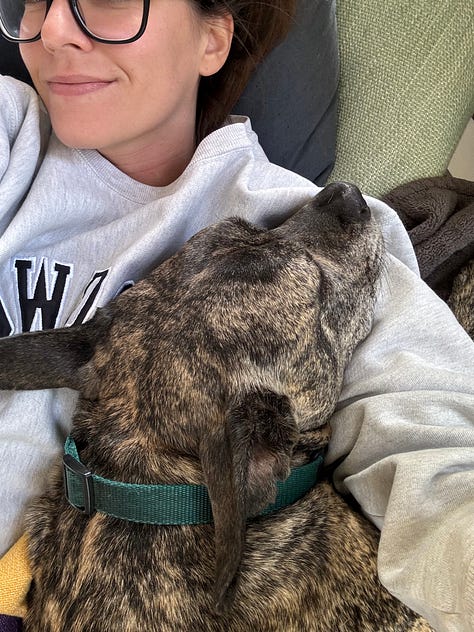
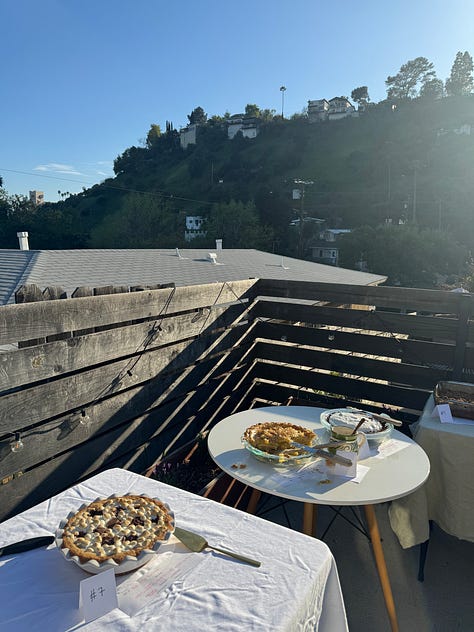
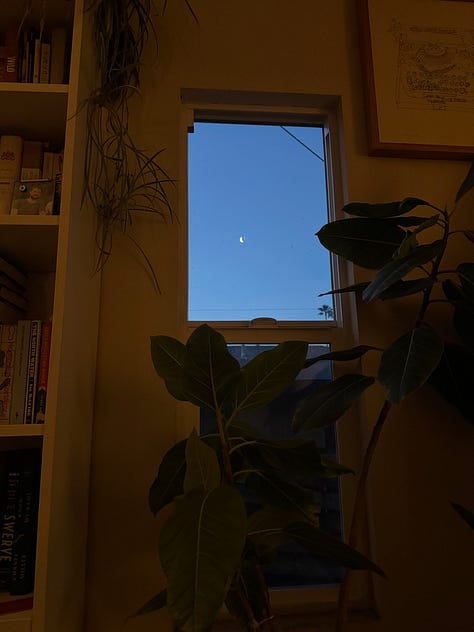

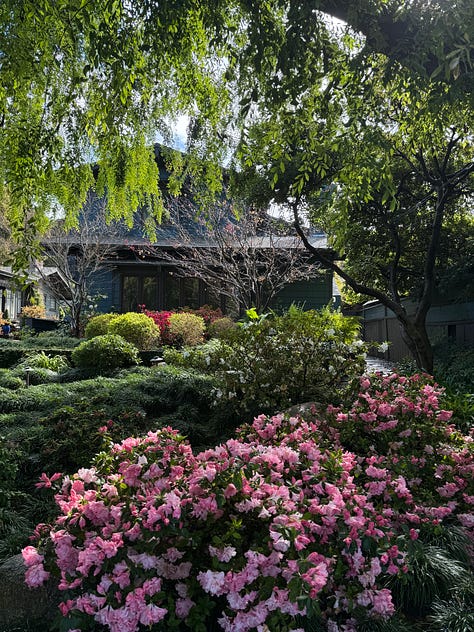
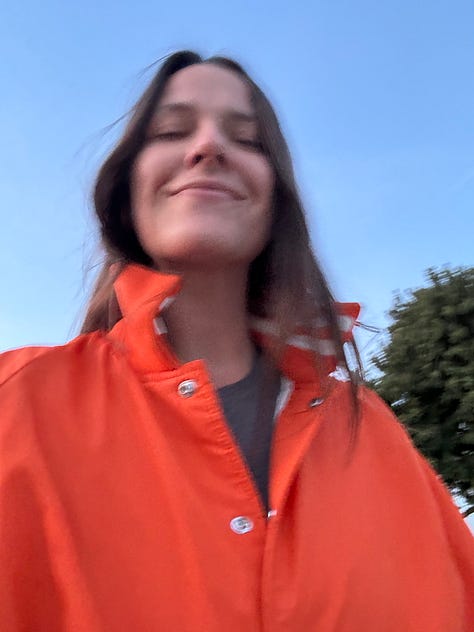

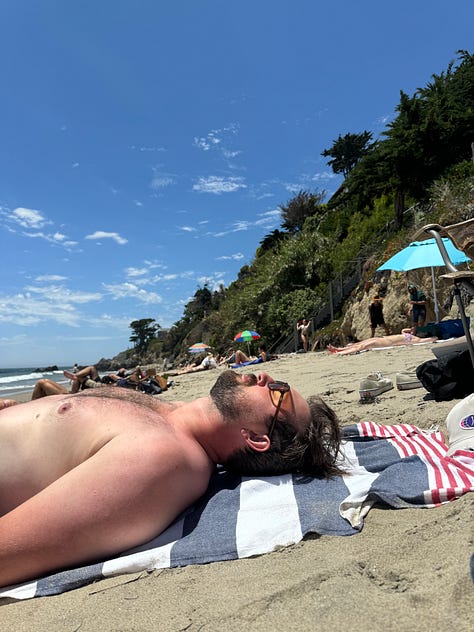

April. I get the call while driving up the I-5 to San Francisco, en route to spend the weekend with my friend Elisa. Brad, from the “Writer’s Bootcamp” program, tells me my application was accepted. I’m now a fellow in a 12-week screenwriting course to help me SELL MY SCRIPT TO HOLLYWOOD, baby. I’m surprised, given how hastily I applied—more as a Hail Mary than a focused, world-changing pitch. I applied because I thrive under deadlines, am a classic eldest-daughter / millennial workhorse, and because I needed a pressure cooker (read: above) to finish my script. Brad asks for more details about it.
“It’s about the complexities of female rivalry, the staying power of female rage, and the enduring power of friendship,” I say, turning down my audiobook on corporate burnout. “Cool,” Brad responds. A few days into the course—annoyingly titled Women Going Places—I’m hardly surprised to learn it’s, ironically, taught by a man.
May. The library is full of pre-teen boys on their phones. Their braces-packed mouths and TikTok-glued eyes shouldn’t intimidate me, but truthfully they do. Teens scare the shit out of me. My teacher friends and The English Teacher on FX have only reinforced their reputation for brutal judgment. I find a table with a garden view, safely away from today’s youth. I’m here because my class has me cooped up too long at home, and I need the hum of other minds around me. Just as promised, I am a woman who has gone to a place: the Pasadena Library.
All month, I’ve been searching for inspiration. I’ve read Skippy Dies, Fi, Molly, Poor Deer, Bear, Bluets, watched films like The Taste of Things, Betty Blue, My Own Private Idaho, Girlhood, and taken my dog, Walnut, on long, meandering strolls where we indulge his every whim. Immersing myself in this script has sparked new energy, spilling into parts of my life I never thought to explore. I’ve started making art—drawing and painting small scenes, sending handmade letters to friends, indulging in creativity without purpose.
And then there’s the creeping doubt: every day, I mutter to myself like a woman possessed, “You can do this. You can do this. Come on, Maggie.” I speak to myself while I pee; when brewing coffee; while cooking dinner. It’s what gets me writing three hours a day, sacrificing friend time, neglecting to call my parents, skipping yoga, ignoring healthy eating routines. It’s what keeps me diving deep into the minds of my flawed and sneaky characters – women with a vengeance, women with something to say. Sometimes I speak like them in the car, truly cementing my spiral. This script has become my life’s center of gravity, pulling me inward, stretching me thin, causing me to disappear for art’s sake. What awaits on the other side of this push? We shall have to wait and see.
“Put less of yourself in the story,” my teacher says, as though personal investment is a flaw. “Women tend to write movies where people just talk,” he announces in our bored Zoom class. And to hammer it home: “All indie films are incomplete.” I could take his advice to heart, finessing the threads he pulls loose in my story, knowing it’s what Hollywood wants. But I keep telling myself I’m here to follow my own voice, my own intuition. I listen to his words, and then choose to ignore them.
June. I get a massage, and my masseuse tells me my rib cage is clogged with something sticky on the left side. I soften butter in the sunlight for cookies. The clouds look like cotton candy, and a spider leaves me a love-bite on my neck during the night. I make squash blossom focaccia. I eat more of the aforementioned butter than I should, which is maybe what’s clogging my ribs. I start painting during work calls and take pictures of flowers everywhere I go.
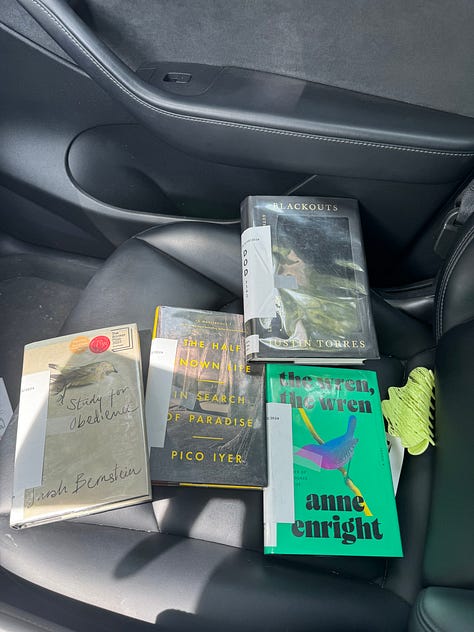



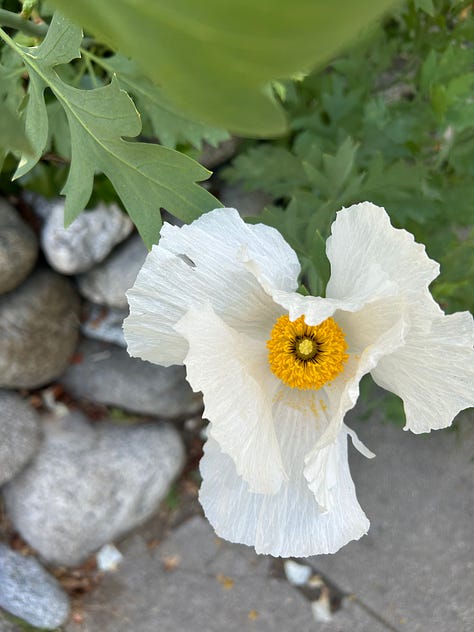
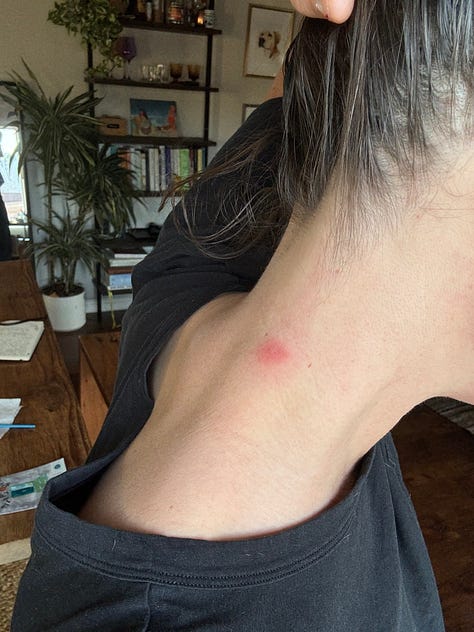
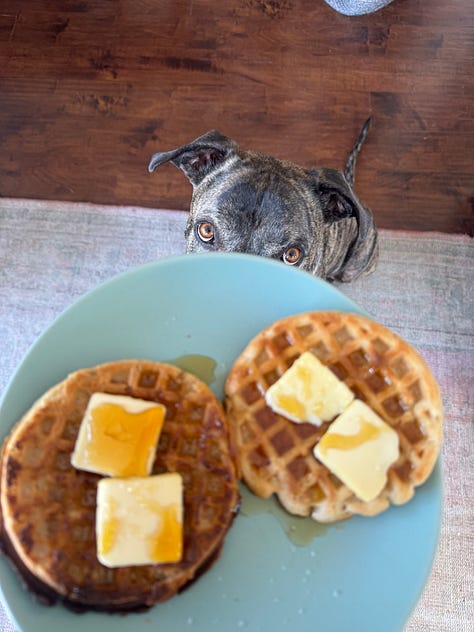
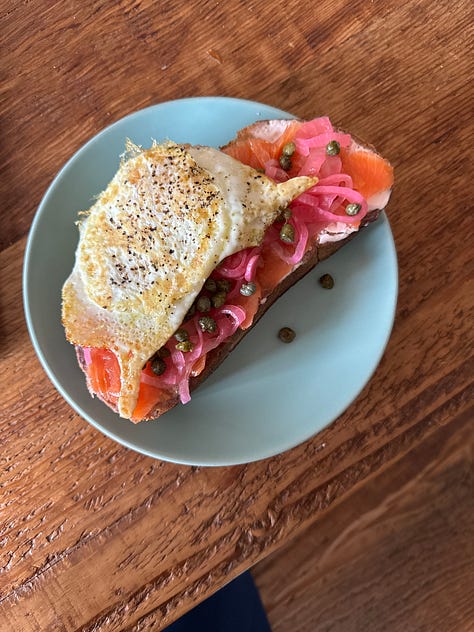
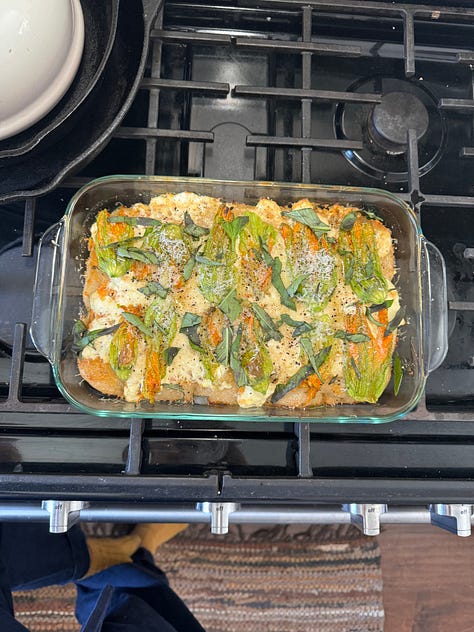
July. Warner and I make a habitat for imaginary animals out of organic play-doh and found leaves, flowers, and twigs. I can hear my high school friends—Steph, Maya, and Liz (Warner’s mom)—inside, making dinner and listening to music. It’s rare we’re all in Maine together, and even rarer to share an evening of conversation. What we discuss: our bodies, our pastimes, our beliefs, our complaints, people we knew and no longer know, Biden dropping out and Kamala taking over. What we don’t discuss: our hopes, our dreams, the future.
One perfect summer day, my parents and I bike on Chebeague Island, eating sandwiches and cold salads and watching the Inn staff set up for a wedding. The ocean air is salty, and I love Maine so much it hurts. I wonder how I ever could have left, even though I know why. At the airport, I dream of ways to return and cry when my boarding number is called.
August. My hands ache, thumb joints sore from 12 feverish weeks of writing. On the plane ride home from Maine, I catch said fever—one part Norovirus, one part mystery—that leaves me bedridden, walking only a few steps at a time, with fainting spells, and battling five panic attacks. This is new and I can’t tell what information my body is trying to give me. I stop being able to drink booze and can no longer indulge in weed (just in time for election szn). My jaw clenches in my sleep, and I can barely eat. Where’s gentle when you need it?
September. I decide to quit social media for good, but during a family trip to Zion National Park, I miss it and wish I could see people’s posts and the inane banter of the internet. Without the distraction of Instagram, I speed-read two books and avoid the Presidential debate recap. Later, I fly to Boston for my sister’s wedding dress shopping, taking a red-eye and landing at 6 a.m., with nowhere to go. I book a day-pass at a health club and spend the early morning swimming under a crimson sky in a heated pool. When I check out, refreshed and showered, the elderly guy manning the front desk tells me I have a trustworthy face.
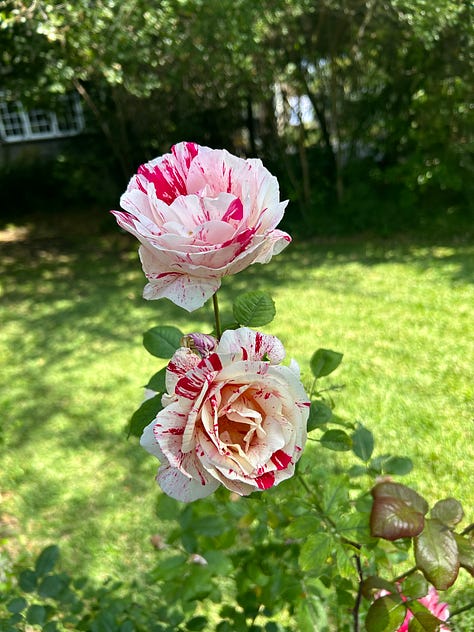
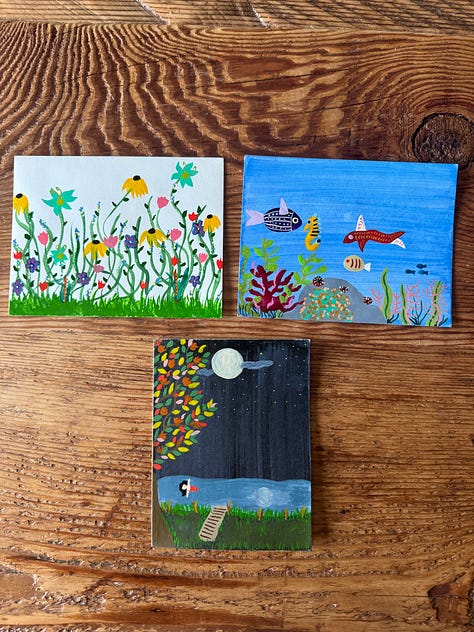



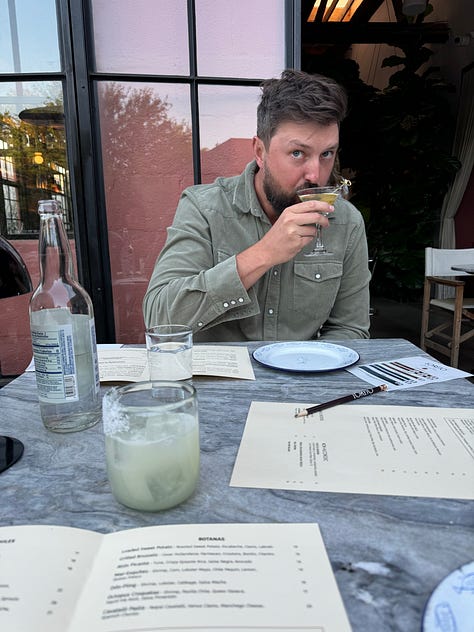

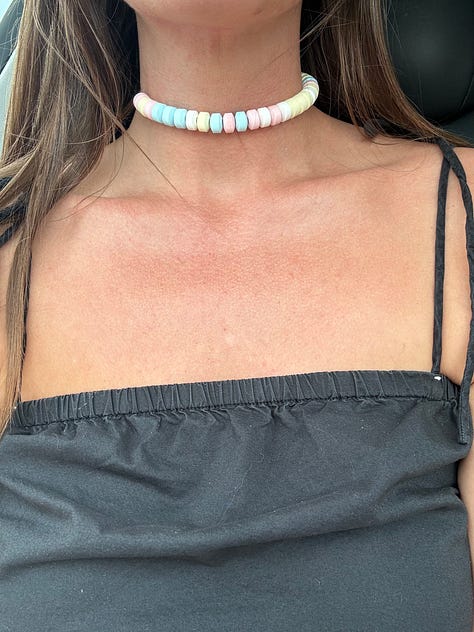
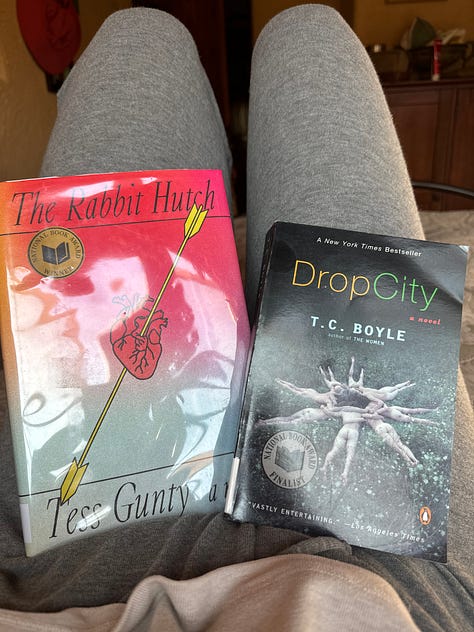
October. My dad and I clean out his basement, sorting through old published work, long-lost letters, golf memorabilia, and family photos. He tells me about a photoshoot he staged for an article, where his girlfriend posed as a murder victim. I almost throw out an unopened onion-skin letter from William Shawn, the New Yorker editor, offering my dad a job—a job that, unopened, evaporated into thin air. Despite the pain in my hands, I write at least 200 postcards to swing states, urging people to vote and save democracy. News flash: they don’t.
November. It feels as though the world has ended. I know it hasn’t, and I know that joy, love, and hope will still find their moments, but pretending that Kamala Harris’s crushing defeat doesn’t alter the future—not only for Americans, but for the world—feels impossible. This election is a wound, one that will leave its indelible mark throughout my lifetime. The reality that so many people would sooner vote for a felon, a rapist, a Nazi sympathizer than consider women’s healthcare and wellbeing—just to pocket a little extra cash (which…don’t even get me started on that)—is beyond disheartening. It is anti-human.
Despair was an undertow this week, pulling me into essays by voices I admire, conversations with my husband about what the future holds—questions of whether to have children, especially daughters, of whether we need to learn how to protect ourselves in ways we never wanted to consider. I see so much work ahead to do and so much to learn. 53% of white women voted for Trump. That solidarity I felt in February? It’s being tested, and it’s failing. Now, I ask myself: how can I be more of service to my community, to women, to trans women, to everyone whose rights are at stake? Whatever it is, it will look different from anything I’ve / we’ve done before. It has to be bolder, braver, and more unwavering.
_________________________________________________________________________
If a year is a collection of days, then mine looked like this. I had envisioned a year of flourishing filled with ease and abundance. But what unfolded taught me that flourishing has its own language, its own timeline—a resilience that runs deeper than I could have ever imagined. What I hoped for was so different than what happened, yet I’m still the same woman I was at the onset: brave, tough, kind, loving. I have changed wholly, and yet not at all. As time goes on, I find it easier to recognize myself, even as I encounter experiences, elections, and upheavals that fundamentally alter my being.
In January I pictured roses at my feet. Now, I see that flourishing is more akin to a lotus flower—its roots sunk deep into mud, grime, shit, and grit, arching toward the sun no matter. Each day I lived added to this picture. There were days I felt bold and open, optimistic and full, stretching toward something unknown. On others, I had to wade through the mud of self-doubt, conflicts, and life’s exceptional complexity. It’s in these moments—braving storms, facing hard truths, adapting—that I’ve come to understand what it means to really flourish. To flourish is not to turn away and throw up one’s hands, saying, “It’s out of my control. What can you do?” That kind of apathy is a poison, reeking of privilege. To flourish is to choose to push in-spite of hardships, to recommit to growth, even in the face of darkness.
Flourishing, I’m learning, is about resilience, about becoming something stronger, about looking at yourself in the mirror and willing that person to be someone more. Life will never be a perfect bouquet. It will always be a balance of recognizing oneself in the muck and the beauty alike. We all have to make our way forward, and to flourish is to know that we can rise, come rain, sleet, hell, high water, or Nazis.







This is beautiful. Knowing there are so many of us out here trying to to make poetry and meaning in the dark is what is getting me through right now.
This was beautiful. Thanks for sharing. ❤️ (p.s. I’m still mad about Brad 👎)